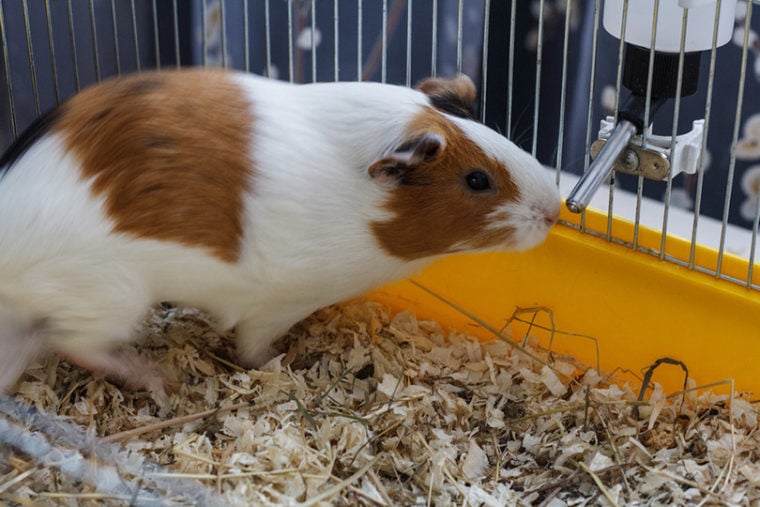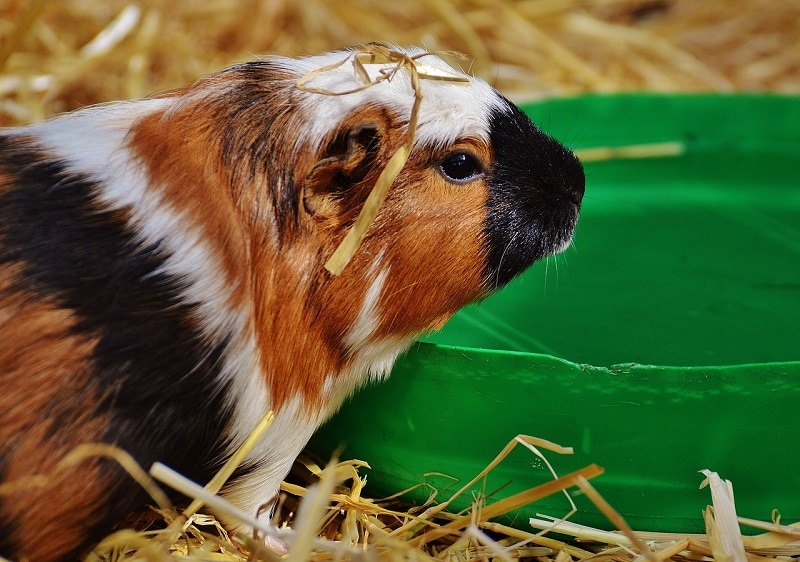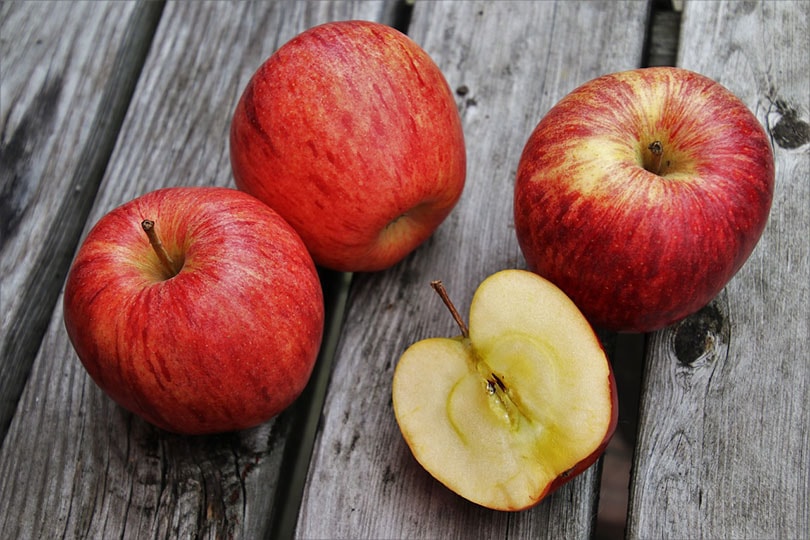
Just like all living creatures, water is incredibly important for guinea pigs and plays a vital role in their body functions. Ensuring that your guinea pig is drinking enough fresh water throughout the day is important. Guinea pigs will naturally seek out water to drink, but it can be concerning if they are not drinking enough water.
If you are looking for ways to encourage your guinea pig to drink more water and stay hydrated, this article will help you.
Why Is My Guinea Pig Not Drinking Water?
It is quite concerning for guinea pigs to not drink water, and it is usually an indication that something could be wrong with them. Small animals like guinea pigs cannot go without water for more than 12 to 24 hours without feeling the effects of dehydration.
Because of the way their digestive system works, dehydration is a serious problem for guinea pigs and requires an immediate trip to a veterinarian. Keep in mind that a guinea pig can still get dehydrated for other reasons other than not drinking enough water. Guinea pigs can lose water fast through diarrhea and abnormally warm temperatures and become seriously dehydrated as a result.
Let’s take a look at the main reasons a guinea pig may not be drinking enough water:

How to Tell If Your Guinea Pig Needs More Water
If your guinea pig hasn’t been drinking enough water lately and you are worried they could be dehydrated, below are some signs to look out for.
The easiest way to determine if your guinea pig needs more water is by doing a skin elasticity test. You can gently pinch the skin between the shoulder blades and watch how fast the skin returns to normal. If the skin bounces back quickly, it is a sign that your guinea pig is hydrated. If the skin stays in the tenting position and takes a bit longer to go down, your guinea pig may be dehydrated.
If your guinea pig is not drinking enough water, they are at risk of becoming dehydrated and having potential health problems like kidney disease or bladder stones.
The 7 Ways to Get Your Guinea Pig to Drink Water
Guinea pigs require constant access to fresh and clean water both day and night. Hydration is key to a healthy and happy guinea pig, so ensuring that they drink enough water is important.
Below are seven easy steps to encourage your guinea pig to drink water.
1. Offer them both a water bottle and a bowl.
Some guinea pigs have different preferences for how they drink water. Although most guinea pigs adjust well to drinking water from a bottle, others might prefer a bowl. If this is the case, offering your guinea pigs both a water bottle and bowl can get them to drink water. You will also be able to spot which of your guinea pigs prefer the bottle, and which ones prefer the bowl.
When choosing a good water bowl for guinea pigs, choose one that is heavy, ideally ceramic, and shallow. You should never place a deep bowl of water in your guinea pig’s enclosure as it puts them at risk of drowning.
When the weather is warm, you should always have a bowl of water available, even for guinea pigs that prefer a bottle. In hot weather, they may not be able to drink a large enough volume from a bottle, plus, they will often use the water bowl to wash their faces and ears as a way of cooling down.
Yes, their bowl will inevitably get dirty, but regularly cleaning a water bowl is a small price to pay for healthy pets.

2. Make sure the water stays cool.
No one likes to drink tepid water, and that includes your guinea pigs. When the weather is warm, make sure their water stays cool throughout the day. You can achieve this in a number of ways:
At the opposite end of the spectrum, make sure their water bottles haven’t frozen in cold temperatures! Guinea pigs should be kept inside or in a warm, insulated shed in the winter, so this shouldn’t happen, but it is possible for icicles to form at the end of the dropper and hinder the flow of the water.
3. Keep multiple water sources in their enclosure.
You should ideally have around two to three water bottles throughout the enclosure at different heights. If the enclosure is large and consists of multiple levels, three or four bottles might be better. Keep some lower than others to be accessible for smaller or sick guinea pigs that cannot strain to reach the higher bottles.
Furthermore, having multiple sources of water in your guinea pig’s enclosure can be a backup option if one of them is empty or faulty in some way.
Having a few different types is also a good option to ensure that your guinea pigs have a choice. Some like a dropper style, while others prefer ones that empty into a shallow dish.

4. Do not add any supplements or vitamins to their water.
Guinea pigs might not want to drink from a water source that has any additives such as vitamins and supplements. However, if you want to add vitamins and supplements to their water bottle, be sure that they have a second or even third bottle that is just pure water and no additives. This allows your guinea pig to choose which bottle they want to drink from.
If your guinea pig is refusing to drink the vitamins from their water, speak to your veterinarian about alternative ways you can ensure your guinea pigs get the vitamins they need. Most of the time, this should be able to be achieved using diet.
5. Keep the water bottle and bowl clean.
You ideally want to clean out their water bottles or bowls daily and refill them with fresh water. Dirty and poorly cleaned water bottles and bowls are a breeding ground for bacteria and algae. Some guinea pigs may even refuse to drink dirty water, so keeping all of their water sources clean is a good way to get them to drink water.
Also, any water bowls can get soiled by substrate, food, poop, and even tipped over. Your guinea pigs’ water bowls will need to be cleaned more often than their bottles.

6. Replace damaged water bottles.
Guinea pigs may chew or damage their water bottles or bowls, which could prevent them from drinking water. You should regularly inspect your guinea pigs’ bottle to ensure that it is working correctly and hasn’t become clogged. If your guinea pigs have been chewing on the bottles and damaging them, they will need to be replaced.
7. Rub some apples on the bottle spout.
Sometimes guinea pigs need a bit of encouragement to drink water. You can rub a slice of apple (or their favorite fruit) along the water bottle spout to entice them to drink from it. The juice from the apple is often enough to get most guinea pigs to start lapping up the water.

How Much Water Do Guinea Pigs Need to Drink Per Day?
Generally, guinea pigs should drink around 1.7 – 3.3 fl. oz (50 – 100 ml) of water per day; volumes of up to 10 fl. oz (300ml) per day is not unusual. This is quite extraordinary, as this is also the normal volume of water consumed by the average cat! A guinea pig’s age, size, health, and activity levels influence the amount of water they drink. It is normal for guinea pigs to drink more water during the warmer months than in winter.
Furthermore, certain health conditions such as diabetes, kidney problems, and dental issues can cause your guinea pig to drink more or less water than usual. If the amount of water your guinea pig is drinking is concerning, we recommend taking them to an exotic veterinarian for a check-up to rule out potential health problems.
Conclusion
Your guinea pigs should have constant access to fresh and clean water to prevent dehydration. Offering them multiple water bottles or bowls around the enclosure ensures that each of your guinea pigs can access and drink from their preferred water source.
You should ideally be inspecting and cleaning their water bottles or bowls daily to keep them clean and working properly. If your guinea pig needs a bit of encouragement to drink water, you can rub their favorite fruit along the spout to entice them.
There are a number of health reasons that may cause a guinea pig to drink less, stop drinking altogether, or even drink more than usual, so make sure you contact your vet if you notice any changes in their drinking habits.
Featured Image Credit: DmitryPron, Shutterstock









